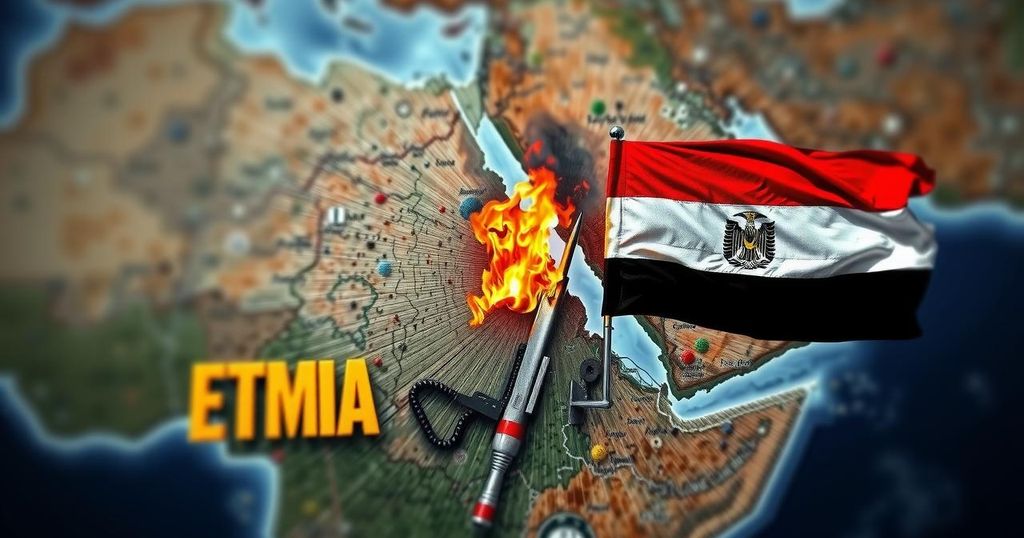Ethiopia and Egypt: Renewed Hostilities and Regional Implications in the Horn of Africa
Ethiopia’s recent recognition of Somaliland and its port deal has intensified tensions with Somalia, which views the action as a sovereignty violation. Somalia has turned to Egypt for support, leading to increased military collaboration amid Egypt’s longstanding rivalry with Ethiopia over the Nile. These events, alongside Eritrea’s alignment with Somalia and Egypt, have created a complex web of regional conflicts, raising the prospect of instability across the Horn of Africa.
Ethiopia has recently been endeavoring to establish alternative maritime access following its port deal with Somaliland announced on January 1, 2024. In this agreement, Ethiopia has recognized Somaliland, which has declared independence from Somalia, in return for a naval base along Somaliland’s coastline. This maneuver has instigated significant diplomatic tensions with Somalia, which perceives this deal as an infringement on its sovereignty, as it insists that Somaliland remains part of its territory. In this evolving geopolitical landscape, Somalia has sought to engage Egypt as a strategic ally to counterbalance Ethiopia’s growing influence. This partnership aligns with Egypt’s interests, particularly given its longstanding rivalry with Ethiopia, accentuated by previous threats of military action regarding the controversial Grand Ethiopian Renaissance Dam, which Cairo views as a jeopardy to its water security. Following a defense agreement with Somalia in August 2024, Egypt has deployed military personnel to the country and plans additional troop placements as part of the African Union Support and Stabilisation Mission, destined to succeed the African Union Transition Mission in Somalia—where Ethiopia plays a critical role. Ethiopia’s formal recognition of Somaliland and its intensified engagement in the region have rekindled tensions with Egypt. Shortly after Egypt’s military deployment, Ethiopia became the first nation to officially acknowledge Somaliland’s independence and has since dispatched an ambassador to Hargeisa, Somaliland’s capital, pushing to cement their bilateral relations through a formal treaty. Simultaneously, the geopolitical dynamics within the Horn of Africa have shifted as Eritrea, a former ally of Ethiopia, seeks closer ties with Egypt and Somalia, bolstering a unified front against Ethiopia. In Somalia, the role of Ethiopia as a stabilizing force is being called into question, and calls for an end to its involvement may inadvertently facilitate the emergence of militant factions like Al-Shabaab, which could exploit the unrest to pursue territorial claims over parts of Ethiopia and neighboring countries. Tensions have also escalated between Djibouti and Somaliland, resulting from the port agreement, which poses risks to Djibouti’s economy, heavily reliant on port revenues generated by Ethiopian trade. The geopolitical strain in the region is compounded by ongoing crises, including strained relations between Ethiopia and Eritrea, disputes over the Al-Fashaga border region between Ethiopia and Sudan, and existing internal instability within Ethiopia itself. This precarious situation raises the prospect of proxy conflicts erupting in these regions. Key areas of concern include: 1. Sudan and Egypt: Both nations have aligned interests regarding the Grand Ethiopian Renaissance Dam and are enhancing their military cooperation amidst Sudan’s internal turmoil, particularly in the context of the Al-Fashaga border dispute, which remains a potential flashpoint against Ethiopia. 2. Instability in Ethiopia: Ethiopia’s internal conflicts provide fertile ground for Egypt to potentially back proxy groups opposed to the Ethiopian government, which may inadvertently exacerbate instability not only in Ethiopia but across the Horn of Africa. To mitigate these rising tensions, a recalibration of strategies by the involved nations is essential. Ethiopia could seek access to maritime resources through Somaliland without the need for formal recognition, thereby averting potential separatist movements. Concurrently, Egypt would benefit from adopting a more constructive stance by engaging in international dialogue about its water concerns through the United Nations and the African Union rather than pursuing unilateral military actions, which have historically led to increased tensions in the region.
The political landscape of the Horn of Africa is marked by the intricate relations between Ethiopia, Somalia, Somaliland, and Egypt. Ethiopia’s control over the Nile River and its ambitious Grand Ethiopian Renaissance Dam project have created longstanding tensions with Egypt, which relies heavily on the river for its water supply. In recent developments, Ethiopia’s diplomatic recognition of Somaliland—an autonomous region that declared independence from Somalia—has threatened Somalia’s territorial claims and escalated regional hostilities, leading Somalia to seek military partnerships with Egypt. This situation has significant implications for the stability of not only Somalia but the broader region.
The recent geopolitical maneuvers in the Horn of Africa reflect rising tensions primarily triggered by Ethiopia’s recognition of Somaliland and Egypt’s military involvement in Somalia aimed at countering Ethiopian influence. The consequences of these developments could lead to further destabilization in an already fragile region, as proxy conflicts may arise and existing tensions between neighboring states are exacerbated. Hence, a concerted effort towards diplomatic dialogue and restraint is crucial for restoring stability and addressing the underlying issues contributing to the ongoing crises.
Original Source: www.theafricareport.com




Post Comment